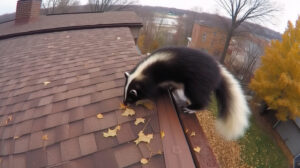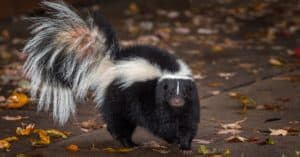Skunks are easily recognized by their distinctive black and white stripes, and when startled, they are known for emitting a foul smell. The stench of a skunk is one of the most repulsive in all of nature. Hence, skunks are among the smelliest animals on Earth, but they can also literally stink up your life in several different ways. Yes, we are talking about skunk poop!
Skunks may appear extremely adorable, yet they can seriously harm your property or garden. Being nocturnal, they frequently go unnoticed for extended periods. Therefore, it is good to be familiar with skunk poop and droppings if you suspect a skunk is residing under your porch, underneath your house, or elsewhere nearby. So, what does skunk poop look like?
You probably never thought you’d be searching for skunk poop images, but knowing about skunk poop can be beneficial. Skunk poop, after all, may be harmful to humans and animals, as it might contain bacteria, larvae, rabies, and other diseases that the pests carry. This article will explore what a skunk poop looks like, its dangers, and other interesting facts.
What Does Skunk Poop Look Like?
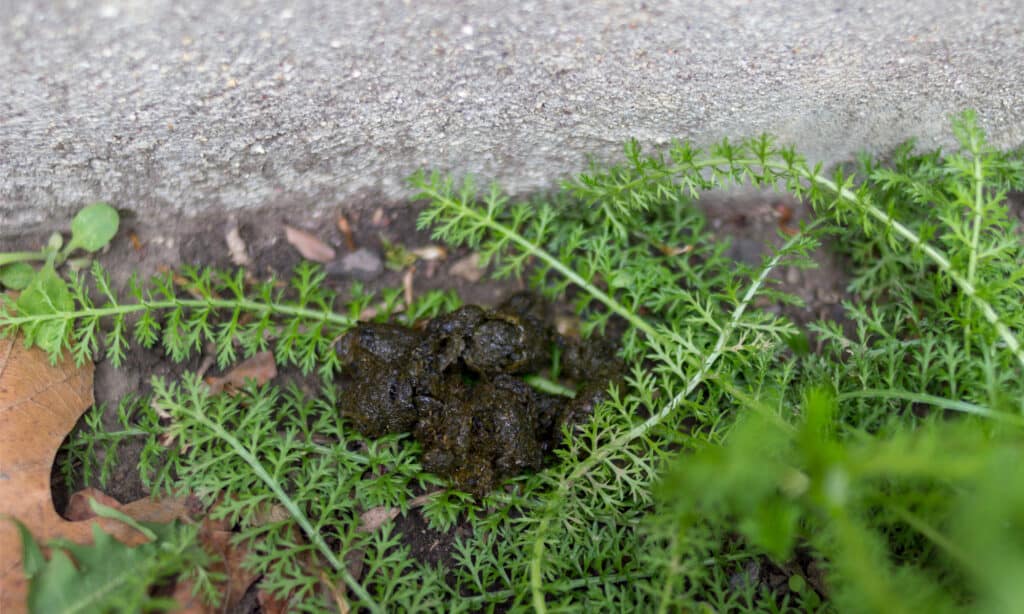
Skunk poop has the outstanding quality of containing many undigested insect parts, such as beetles.
©iStock.com/KathrynSK
Skunks consume a wide variety of food, so their feces can have a wide range of appearances. It is also influenced by other aspects, like the weather and the period since the deposit. Skunk scat is similar to cat poop, but the former has several other unique features. They come in mounds close to the skunks’ nesting areas and have a tubular shape, smooth surfaces, and blunt ends.
Striped skunk scat is between 1 and 2 inches long and between 1/2 and 1 inch in diameter. Their droppings often fall apart when prodded with an object. Skunk poop has the outstanding quality of containing many undigested insect parts, such as beetles. Skunk scat includes numerous things in addition to insects, including seeds, berries, fur, feathers, grass, etc. The droppings of hooded and spotted skunks seem identical but are only half as large.
Feces from skunks are either crumbly, mushy, or hard. The remains could range in color from pale brown to dark or even black. Look around areas where you think skunks may have been feeding, burrowing, or close to what you suspect might be a den. Here is what to check for when determining if skunk scat is fresh or old: brighter, darker droppings that are moist to the touch are fresh. Older skunk feces is frequently discolored and will crumble or become ground up. You can determine if the droppings are soft and new or dry and old by squishing them with a stick.
Where Do Skunks Poop?
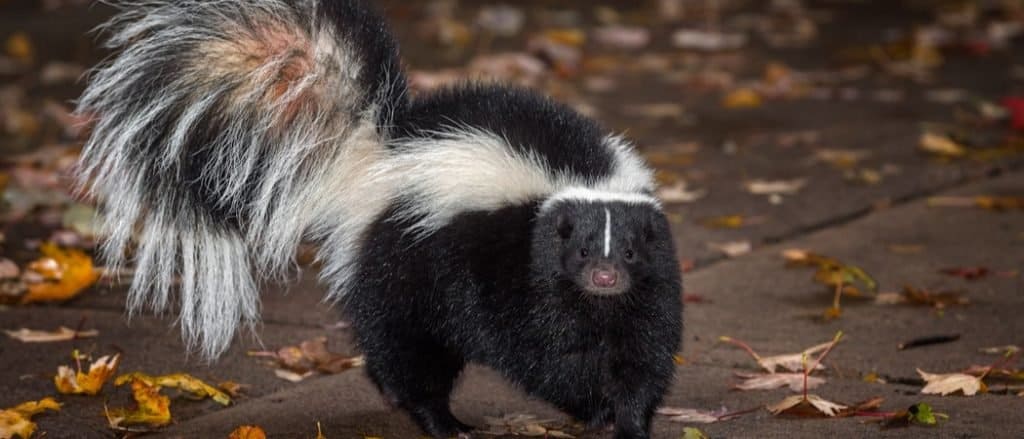
Skunks poop wherever they please, so their scat may appear in your backyard, basement, or attic.
©Geoffrey Kuchera/Shutterstock.com
Unlike raccoons, skunks do not poop in the same spot. They poop wherever they please, so skunk scat may appear in your backyard, basement, or attic. Additionally, it is present in gardens and lawns, so other animal feces might be there if you live near a forest or woods. Skunks are also nocturnal, which means they poop at night, making locating the waste during the day challenging.
Always remember that skunks are frequently drawn to your property in quest of food. To help lower the likelihood of coming into contact with skunk poop, keep your yard and property clear of food waste, and ensure your trash cans are tightly closed.
Does a Skunk’s Scat Smell Better Than Its Spray?
Yes, the stench of skunk scat would be hundreds of times more tolerable than the spray. However, considering the stinging sensation that anal spray causes in humans and animals, one would question whether skunk poop is also repulsive. When a skunk sprays your dog or, heaven forbid, you, the last thing on your mind is the smell of the skunk’s poop. Although the smell of skunk droppings is unpleasant, it differs from the scent of the oil-based glandular protective spray, which should not be a surprise.
The feces and the skunk spray have separate sources and chemical compositions. The skunk spray is glandular and has an oily base, unlike the feces, which contain both undigested and digested food remains. Skunk spray can even be smelled up to a mile away. Skunks allegedly find the smell of their own odor disgusting, so they refrain from spraying in their own dens because of this.

Skunk spray has a far worse odor than its scat.
©Geoffrey Kuchera/Shutterstock.com
Is Skunk Scat Hazardous?
Yes, skunks pose many other hazards besides their toxic spray. This pest is classified by the Centers for Disease Control and Prevention (CDC) as a rabies threat and their scat can be a carrier of the following illnesses, viruses, and parasites: listeriosis, hepatitis, leptospirosis, Q-fever, tularemia, Trypanosoma, ringworms, tapeworms, canine distemper, equine protozoal myeloencephalitis, and feline panleukopenia.
What do those big words actually mean? For your dog, lethargy, fever, nausea, diarrhea, and neurological damage are all possible side effects that could result in chronic illnesses. Feline panleukopenia frequently results in death for your cats. For your horses, this could entail serious nerve damage that causes weakness, muscle weakness, paralysis, and lameness. Those are all undesirable.
The worst part is what some of these terrible things can do to humans. The symptoms of listeriosis include weakness, constipation, rash, and fever, and they can progress to paralysis and brain swelling. The liver, spleen, kidneys, and lungs are all affected by hepatitis. Roundworms, such as baylisascariasis, can enter the brain, liver, or eyes and cause neurological damage, blindness, or even worse.
What Do Skunks Eat?
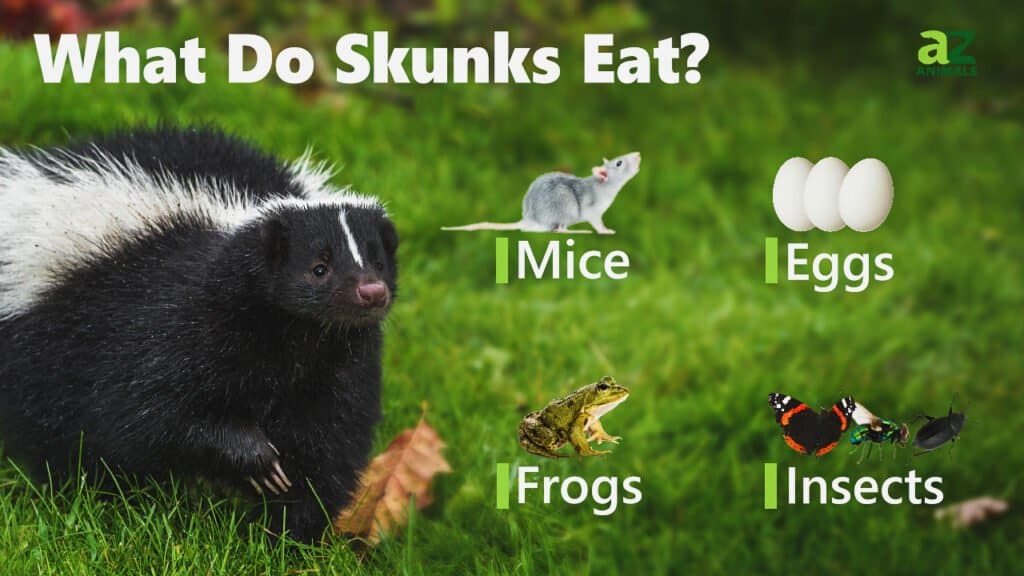
Skunks are omnivores, while biologists consider them opportunistic feeders. Skunks consume whatever is in season and raid trash cans, pet food bowls, and containers. Insect larvae, lizards, rodents, worms, frogs, small birds, snakes, and eggs are among the preferences of skunks. Skunks frequently destroy flower beds and gardens when looking for worms or grubs. They often come into bad terms with humans because of their propensity for scavenging. Along with skunk scat, there are typically additional unpleasant indications that skunks are there, including the characteristic skunk odor, trampled gardens and lawns, and damage when they penetrate and stay inside of homes.
How Do You Get Rid of Skunk Scent?
So you got a little too close to that stinky critter and got sprayed! It’s a challenge, but not an impossible one, to get rid of the skunk scent. It’s best to move quickly if you’ve been sprayed, as the spray can absorb into your skin and linger for a long time. It’s best to take a shower immediately and also throw your sprayed clothes in the wash right away. Some say to bathe in tomato juice, but you can also mix peroxide and baking soda with dish soap and use it as a skin scrub. These are good odor killers, however, peroxide or one of the other ingredients could cause allergies in those with sensitive skin.
If a skunk has entered your home and sprayed, there are several things you can try to get rid of the smell.
- Create an apple vinegar spray–2 parts water and 1 part apple cider vinegar–to use for cleaning the initial area.
- Use chlorine bleach with apple cider vinegar in mop bucket with hot water for neutralizing the smell. Be careful of fabrics and hard surfaces that could lose coloration.
- Open windows to air out your home as much as possible.
- Steam-clean rugs, carpets, and fabric furniture.
The photo featured at the top of this post is © Jeremy Richards/Shutterstock.com
Thank you for reading! Have some feedback for us? Contact the AZ Animals editorial team.



